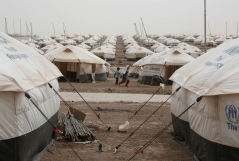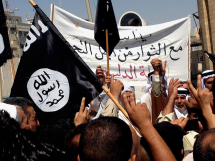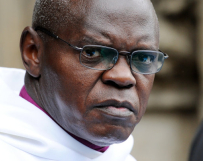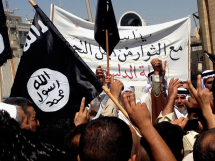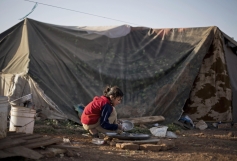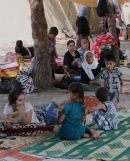
The Archbishop of Canterbury today met with leaders and representatives from Middle Eastern churches in the UK, and joined them in condemning the ongoing crisis in Iraq.
Describing the discussion with his contemporaries as "the most powerfully moving experience," Archbishop Justin Welby began by offering his condolences to the family of Steven Sotloff – the journalist who was murdered by Islamic State militants in a video released yesterday.
"Our prayers and thoughts are with Steven Sotloff's family during this time, and with all his friends in the press who will be grieving," Welby said.
"We remember that he is both the latest, and most prominent recent victim, but also that he represents many who have suffered in that area who are forgotten day to day."
Reading from a joint statement, the Archbishop then denounced "the recent increase in violence and aggression [which] has resulted in gross violations of the fundamental rights and freedoms in the region.
"We gathered today as Christians, including those originally from the Middle East, to stand in solidarity and prayer with our brothers and sisters who seek to practise their faith and belief in lands where they have been a continuing presence for centuries," he continued.
He said the Middle East is the "birthplace of Christianity, and home to indigenous Christian communities that have been an indispensible part of its history" and added that the region is "in desperate danger of losing an irreplaceable part of its identity, heritage and culture."
The church leaders called upon Christians to pray for peace and reconciliation in Iraq, and committed to speaking "for freedom from persecution for Christians and all other religious communities and those of no faith who live as minority groups across the region.
"We also continue to urge Her Majesty's Government to work with the international community to safeguard and provide for those affected," the Archbishop concluded.
Asked whether he felt the plight of Iraqi Christians in particular had received enough media coverage, Welby responded: "When you're looking at the murder and the slaughter of vast numbers of people, there is never enough in terms of coverage.
"It's easy to forget that this is part of a global process of immense suffering, but I think in looking at the Middle East we hope that the media will not move on quickly, but will continue to remember those who are suffering so greatly."
With regards to granting asylum to those suffering from persecution, he insisted that "the last thing we want to do is empty the Middle East of Christians," and advocated for "the provision of safe havens and security to enable people to re-establish their communities and identity in the area.
"Christians have been there for longer than anyone else, which needs to be remembered," he added.
After leading those gathered in prayer, the Archbishop and his contemporaries then made their way to Westminster Abbey, where a multi-faith prayer vigil was held.
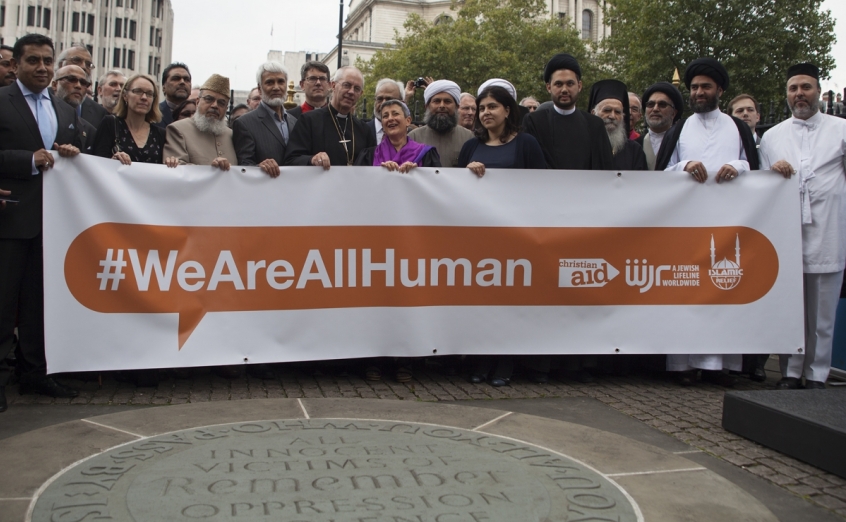
Members of various religions joined together in a unique show of solidarity, urging those gathered to raise their voices on behalf of persecuted communities.
Welby spoke once more, alongside Imam Ibrahim Mogra of the Muslim Council of Britain, Rabbi Laura Janner-Klausner of the Movement for Reform Judaism and Ayatollah Dr Sayyid Fadhil H Al-Milani.
"The stories are absolutely heartbreaking and heart-rending," the Archbishop said of those suffering in Iraq.
He praised the show of solidarity and commitment from those of all faiths in the face of the escaltating violence. "It is vital that we are here today as people of many different religions," he said, commending the joint effort of Christian Aid, Islamic Relief and the World Jewish Relief.
"It speaks to the horror that what is happening has bought to all our hearts and minds...We have to stand against it there, and we have to stand against it here.
"We must stand against all culture of impunity, all culture of colluding with violence, and we must remember that we are all human...It is a moment for this to end. It must stop.
We must be deeply committed, because if it does not stop there, and in other places around the world such as northern Nigeria...it will continue to spread. It will require courage and time and determination to overcome this evil."
Imam Ibrahim Mogra, who also sits on the Christian/Muslim forum, said that interfaith encounter is not just about "talking over tea and biscuits," but "it is also about action, which is demonstrated here today."
"It is crucial that the humanitarian dimension should be given top priority to ease the plight of all those who are effected in Iraq, especially minority communities," Mogra added, noting that members of these marginalised groups are "fully-fledged Iraqis, who have lived there for centuries peacefully and securely under centuries of Muslim rule. That is the mark of a truly Islamic, just state."
"No-one's blood is redder than anyone else's," was Rabbi Laura Janner-Klausner's opening remark.
"As faith communities we will always stand together against tyranny, oppression and the violation of human rights, and we pray for all those suffering in Iraq," she said
"Our blood and our souls are the same."










